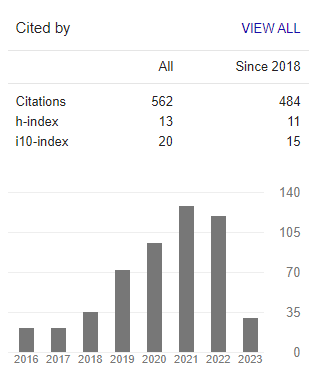FGDNOGRAPHY: Discussing a Topic in the Nature of the Topic
Abstract
FGDnography is a research method that combines data collection techniques through FGD (Focus Group Discussion) with ethnographic research approaches. In FGDnography, group discussion about a topic occurs in a venue that follows the theme discussed. The nuance, situation, environment, ambiance, and attributes inherent in the location support the topic. Discussions become more lively, real, and relevant. As a result, the insights obtained are more natural, authentic, and meaningful. Several aspects deserve attention in FGDnography, including natural-ness, discuss-ness, interactive-ness, responsive-ness, meaningfulness, and experience-ness.
FGDnografi: Mendiskusikan Sebuh Topik sesuai Karakter Topiknya
FGDnografi adalah metode penelitian yang menggabungkan teknik pengumpulan data melalui FGD dengan pendekatan riset etnograpfi. Dalam FGDnografi, diskusi kelompok tentang topik diselenggarakan di tempat yang sesuai dengan topik yang dibahas, sehingga nuansa, situasi, lingkungan, ambians, dan atribut-atribut yang melekat di tempat tersebut mendukung isu yang dibahas. Diskusi topik menjadi lebih hidup, nyata, dan relevan. Hasilnya, insights yang diperoleh lebih natural, otentik, dan meaningful. Ada beberapa aspek yang patut diperhatikan dalam FGDnography, di antaranya aspek kealamiahan (natural-ness), kediskusian (discuss-ness), interaktivitas (interactive-ness), responsivitas (responsive-ness), kebermaknaan (meaningfulness), dan kepengalamanan (experience-ness).
To cite this article (7th APA style):
Wijaya, B. S. (2016). FGDnography: Discussing a Topic in Nature of the Topic. Journal Communication Spectrum: Capturing New Perspectives in Communication, 6(2), 176-200
Keywords
References
Agar, M., & Macdonald, J. (1995). Focus Groups and Ethnography. Human Organization, 54(1), 78-86. www.jstor.org/stable/44126575
Axelrod, M. D. (1979). The Dynamics of the Group Interview. In Higginbotham, J.B. and K.K. Cox (eds.), Focus Group Interviews: A reader. Chicago: American Marketing Association. Also, in Advances in Consumer Research IV (1976), 437–41.
Desvousges, W. H. and Smith, V. K. (1988). Focus Groups and Risk Communication: The Science of Listening to Data. Risk Analysis, 8, 479–484
Nyumba, T. O., Wilson, K., Christina J. Derrick, C. J. and Mukherjee, N. (2018). The use of focus group discussion methodology: Insights from two decades of application in conservation. Methods in Ecology and Evolution, 9, 20–32
Suter, E. A. (2000). Focus Groups in Ethnography of Communication: Expanding Topics of Inquiry beyond Participant Observation. The Qualitative Report, 5(1), 1-14.
Johnston, R., Weaver, T., Smith, L., & Swallow, S. (1995). Contingent Valuation Focus Groups: Insights from Ethnographic Interview Techniques. Agricultural and Resource Economics Review, 24(1), 56-69. http://doi.org/10.1017/S1068280500003610
Garfinkel, H (1967). Studies in Ethnomethodology. NJ: Prentice Hall
Greenbaum, T. L. (1993). The Handbook of Focus Group Research. New York: Lexington Books
Gobo, G. (2008). Doing Ethnography. Sage
Hammersley, M. (1992). What's Wrong With Ethnography: Methodological Explorations. New York: Routledge, Chapman and Hall
Hammersley, M. & Atkinson, P. (2007). Ethnography: Principles in practice. Third Edition.Routledge Taylor & Francis Group.
Higginbotham, J. B. and Cox, K. K. (eds.) (1979). Focus Group Interviews: A reader. Chicago: American Marketing Association
Kaplan, R. and Kaplan, S. (1989). The Experience of Nature: A Psychological Perspective. New York: Cambridge University Press
Mishler, E. G. (1986). Research Interviewing: Context and Narrative. Cambridge: Harvard Univ. Press
Morgan, D. L. (1988). Focus Groups as Qualitative Research. Newbury Park CA: Sage Publications
Peterson, K. I. (1979). The Influence of the Researcher and His Procedures on the Validity of Focus Group Sessions. In Higginbotham, J. B. and Cox, K. K. (eds.), Focus Group Interviews: A reader. Chicago: American Marketing Association
Wijaya, B. S. (2015). From Selection to Proposition: Qualitative Data Analysis Models and Methods. Journal Communication Spectrum, 5(1), 1-12
Spradley, J. P. (1979). The Ethnographic Interview. New York: Holt, Rhinehart and Winston
Templeton, J. F. (1987. Focus Groups: A Guide for Marketing and Advertising Professionals. Chicago: Probus Publishers
Turner, R. (ed.) (1974). Ethnomethodology: Selected Readings. Middlesex: Penguin Education
Tyler, S. A. (ed.) (1969). Cognitive Anthropology: Readings. New York: Holt, Rhinehart and Winston
Sim, J., Waterfield, J. (2019). Focus group methodology: some ethical challenges. Quality and Quantity, 53, 3003–3022. https://doi.org/10.1007/s11135-019-00914-5
Smithson, J. (2000). Using and analysing focus groups: limitations and possibilities. International Journal of Social Research Methodology, 3(2), 103-119
Fetterman, D. M. (2010). Ethnography: Step-by-Step. 3rd Edition. Sage
Ladner, S. (2014). Practical Ethnography: A Guide to Doing Ethnography in the Private Sector. Left Coast Press
Refbacks
- There are currently no refbacks.

This work is licensed under a Creative Commons Attribution 3.0 License.
Indexed by:
Archived in:
Listed in:
INTERNATIONAL ASSOCIATION FOR MEDIA AND COMMUNICATION RESEARCH

















